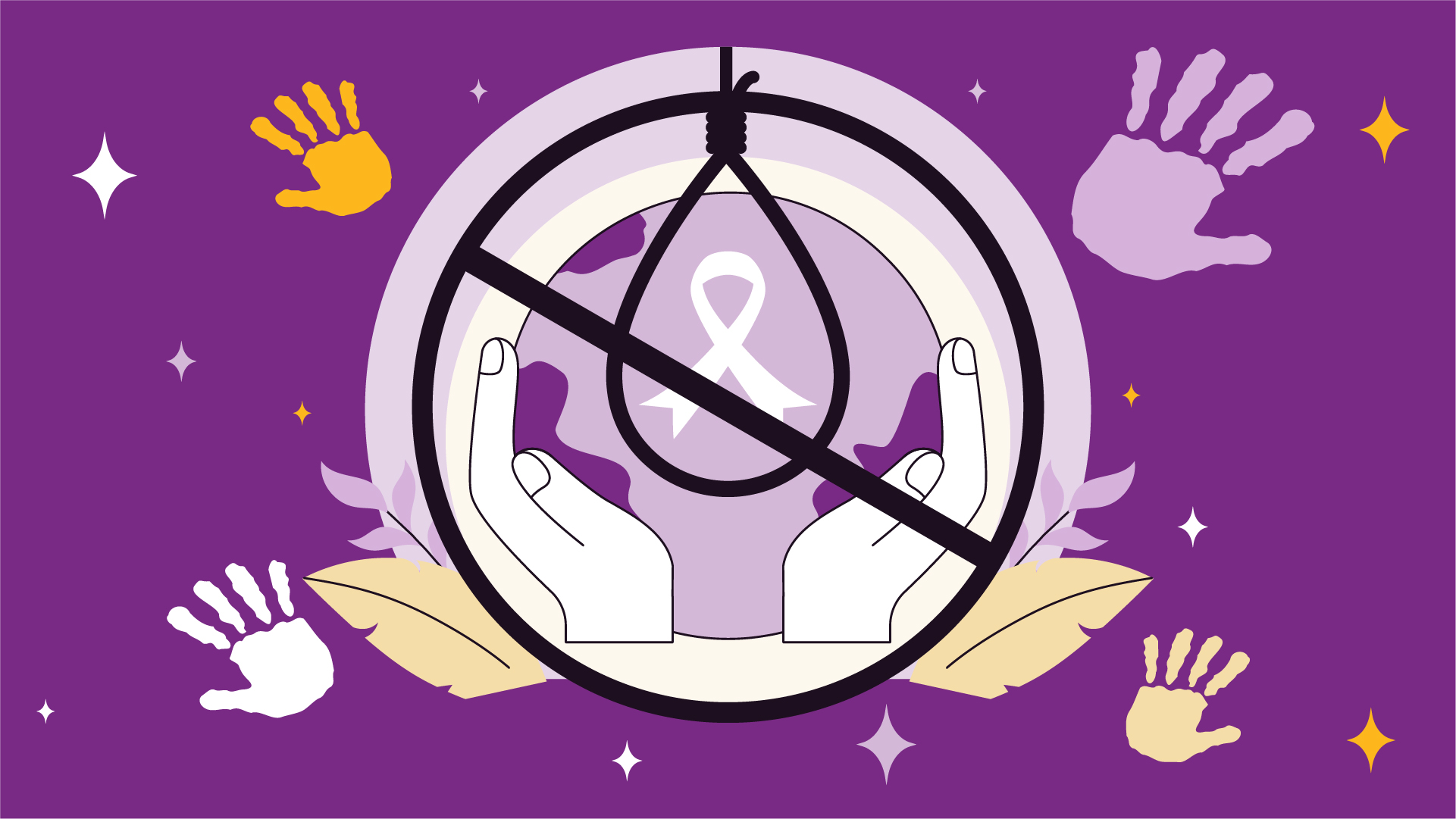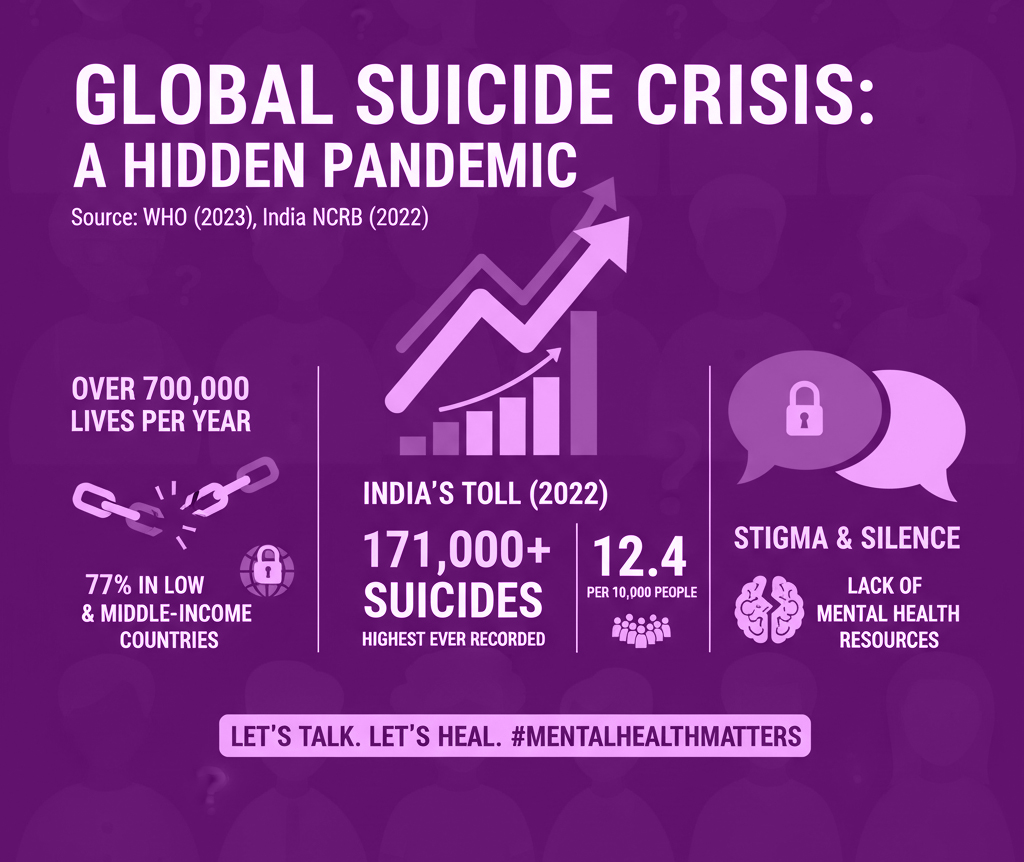By
•
Saisri Pinnam
10 September 2025
•
5 min read


Not every sadness is “drama,” and not every suicide is caused by depression. Behind every struggle lies a unique story circumstances, pressures, or invisible battles no one else can see. Yet as a society, we are quick to judge instead of listening.
If someone talks too much, they’re questioned. If they’re quiet, they’re labeled. If they smile, it’s doubted. If they cry, it’s dismissed as drama. And if they seek therapy, it becomes gossip. The truth is, many don’t stay silent we just don’t always hear them.
According to the WHO (2023), over 700,000 people die by suicide every year, with India recording 171,000 cases in 2022 alone the highest ever. These are not just numbers. They are lives, stories, and futures cut short, often because stigma and silence stood in the way of help.
Suicide is not weakness. It is the result of overwhelming distress, loneliness, and the absence of care at the right moment. Prevention is not only about helplines or campaigns but about everyday culture schools where struggle isn’t shamed, workplaces that value well-being, families that embrace vulnerability, and friendships that notice the silence.
Each of us has a role: to listen without judgment, to show kindness, to remind someone they matter. Even the smallest gesture can give someone a reason to stay.
If you’re reading this, remember: you are not alone. Life gives you new pages every day, and it’s yours to write with pauses, edits, and fresh beginnings. Staying alive is not just survival; it is an act of courage.
Every cold is not sinusitis. Every headache is not a migraine. Every sadness is not “drama.” Every struggle is not “attention-seeking.” And every suicide is not due to depression. Sometimes it’s a circumstance, sometimes unbearable pressure, sometimes loneliness that feels endless or invisible battles no one else can see. Behind every story, there’s a different root cause.
And yet, as a society, we are quick to judge.
If we talk too much, people ask why.
If we talk less, they say you’re not smart enough.
If we smile too much, they suspect something.
If we speak out our feelings, they call it attention-seeking.
If we cry, they label it drama.
If we seek therapy, it becomes gossip.
And if someone ends their life, we think, if only they had spoken…
At the end of the day, no matter what we do, judgment shadows us.
But the real question is:
Did they not speak, or did we choose not to hear and were we too busy to help?

According to the World Health Organization (2023), suicide remains one of the leading causes of death worldwide, claiming over 700,000 lives every year. More than 77% of these occur in low- and middle-income countries, where stigma and lack of access to mental health resources compound the crisis. In 2022 alone, India reported over 171,000 suicides, the highest ever recorded, marking a rate of 12.4 per 100,000 people. Yet conversations around mental health often remain hidden under layers of shame and silence.
Mental well-being matters as much as physical health. Life is not always smooth; everyone faces moments when challenges feel overwhelming, when pressure feels unbearable, or when emotional strain takes its toll. These moments are not signs of weakness or failure. They are signals that you need support, reflection, and care. Every obstacle, whether visible or hidden, has a path forward — but navigating it often requires both patience and the willingness to seek or offer help.
Yet sometimes, despite support, guidance, or intervention, the weight can feel impossible to bear. When pain reaches that point — when someone feels isolated, unheard, or trapped in a state of helplessness — thoughts of ending one’s life may surface. These thoughts are not weakness; they are the mind’s response to overwhelming psychological distress, often linked to acute stress, depressive episodes, or a sense of entrapment, when no way forward seems visible. And the tragedy is not only in the loss of life, but in the silence, the unseen struggle, and the absence of care before it was too late. Suicide is not the person’s failure; it is the ultimate consequence of unaddressed turbulence.
If every judgment could be replaced with a moment of listening…
If every stigma-filled whisper could be replaced with a voice saying, “It’s okay to get help”…
On this World Suicide Prevention Day, let’s remind ourselves:
Suicide prevention is not only about helplines or campaigns, but about building everyday culture. It’s about classrooms where young people are not shamed for struggling. Workplaces where mental well-being is valued as much as performance. Families where vulnerability is met not with blame, but with open arms. Friendships where silence itself is noticed and cared for.
We all have a role in prevention, not as experts or therapists, but as humans. To notice, to ask, to care, and to sit in silence with someone who doesn’t have the words.
Your story is still unfolding, and the world is better with you in it. Every day is a chance to begin again, to turn the page, and to write the next chapter because your story can always start new. Don’t hand over the pen to judgment, stigma, or despair. Don’t let anyone else complete your story for you. This is your life, your story to write, with all its pauses, edits, and paths yet to explore.
Staying alive itself is an act of courage
As Anita Muktaa Shouryaa writes in Being There Matters :
“To win my battles, I will STAY ALIVE
I will start living
I will make known
‘My purpose’, on my own.”